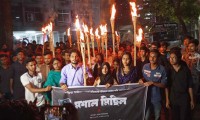
A constitution is a set of fundamental principles or established precedents according to which a state or other organization is governed.
These rules together make up, i.e. constitute, what the entity is.
When these principles are written down into a single document or set of legal documents, those documents may be said to embody a written constitution; if they are written down in a single comprehensive document, it is said to embody a codified constitution.
Some constitutions (such as the constitution of the United Kingdom) are uncodified, but written in numerous fundamental Acts of a legislature, court cases or treaties.
The Constitution of Bangladesh (Bengali: বাংলাদেশের সংবিধান Bangladesher Shongbidhan) is the supreme law of the People's Republic of Bangladesh.
It was adopted on November 4, 1972. The constitution establishes a unitary state and a Westminster form of unicameral parliamentary democracy.
The document's original drafters, notably Kamal Hossain, have called for major reforms to bring it in line with the 21st-century.
As per the constitution of the republic, Bangladesh comprises three basic organs:
- Legislative Branch
- Executive Branch
- Judicial Branch




